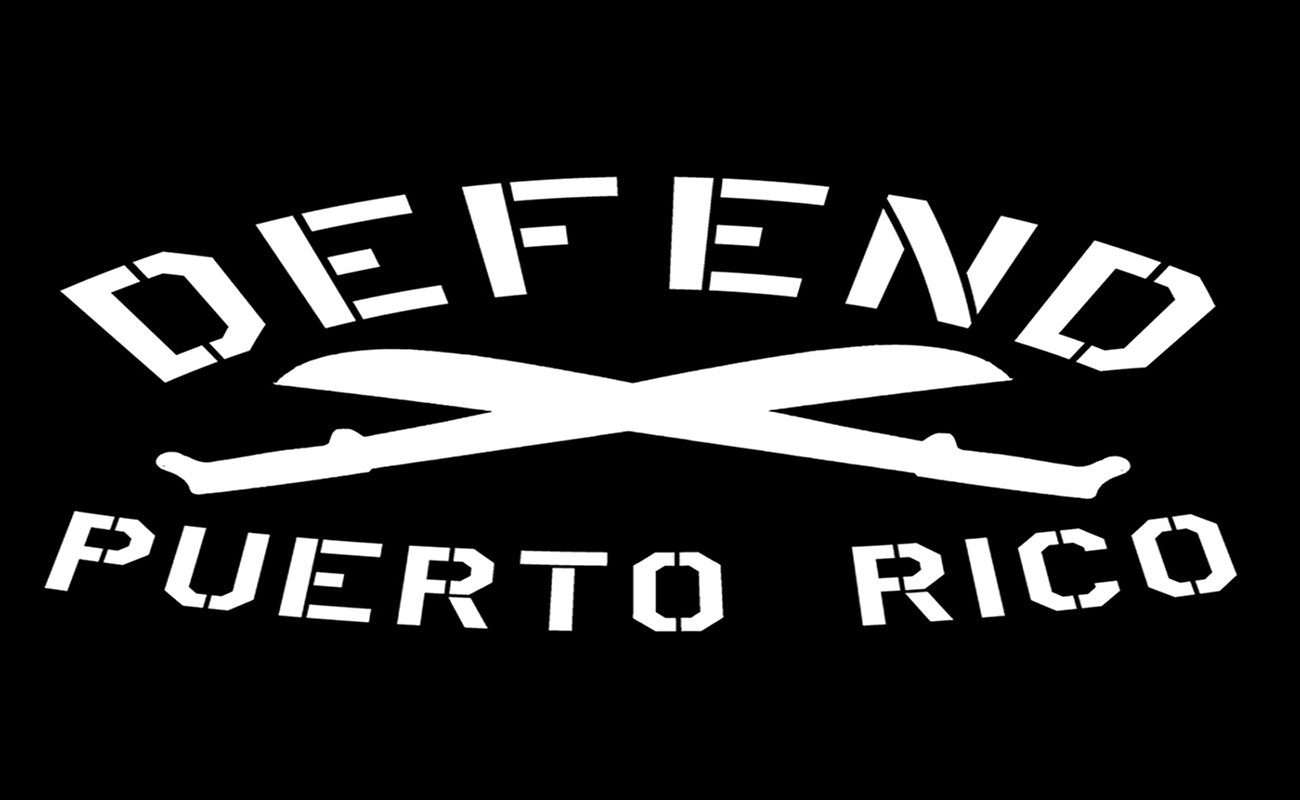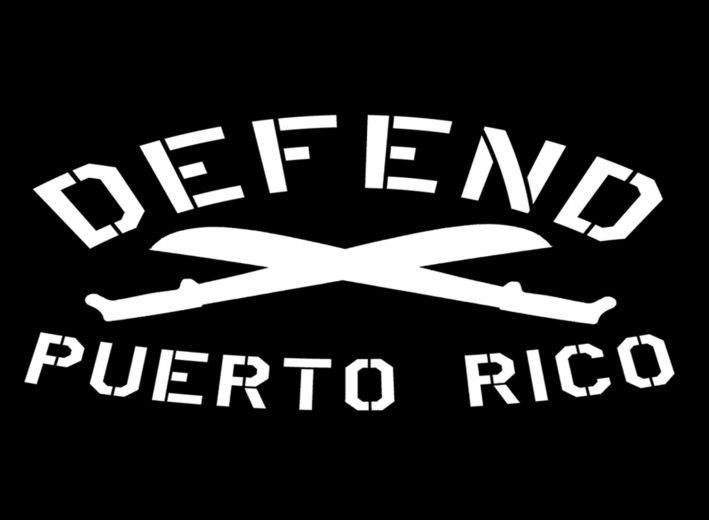
The plight of Puerto Rico’s status has always been a complicated and confusing one. The politics are complex for one of the last territories to exist. Its a place where you can both be a U.S. citizen, but have no right to vote in a U.S. presidential election. Its also a place where you can get into debt and not be afforded the same bail out options as a state.
It’s a plight long-time activist Christian Martir knows all too well. The Santurce-born Sociedad Records founder has spent most of his adult life organizing on behalf of the island – from campaigning for Puerto Ricans stateside to register to vote to re-creating a Batey Urbano – an artist hub and community for like-minded Boricuas – in Orlando. So, when the most recent economic crisis hit the island he knew it was a call to action.
Enter Defend Puerto Rico (DefendPR), the brainchild of four creative friends: Christian Martir, Adrian “ Viajero” Roman, Eli Jacobs-Fantauzzi and Michael Shawn Cordero. All were frustrated with the current economic climate of Puerto Rico and its coverage, so together created Defend PR – a multi-media project that documents first-hand accounts of the people living amid the economic turmoil. The vision of DefendPR is to amplify the voices of everyday Puerto Ricans working to build a new Puerto Rico where its land, people and culture flourish. DefendPR executes this vision by using people-centered approach to storytelling and the dissemination of personal and community narratives. ‘LLERO caught up with cofounder Christian Martir to discuss the vision of DefendPR, the most inspiring things people are doing to combat the crisis and how you can get involved.
‘LL: How did the idea for DefendPR come to be?
Christian: It all started as [a] conversation last summer. We were all just wanting to do something regarding what was going on in Puerto Rico and the economic situation and debt crisis – and we weren’t sure what we wanted to do. What I wanted to see was something like during the whole Vieques thing there was a website we could all go to like viequeslibre.com. What I liked about that website was that it provided news, stories and resources. I wanted our site to be something like that where people can go on and get resources and just become aware of what’s really going on in Puerto Rico – specifically, with the debt crisis but also in a broader sense. But because we are all artsy and creative people what came out of that was to document what was going on but to also allow other people to tell their stories. So Adrian, Eli and Michael went out to PR and started recording and finding out what people were doing to combat what was going on. To see how are you in your own way and your own work defending Puerto Rico as someone that stays in contrast to what’s going on. The next phase is to find people here in the diaspora [the United States] who are doing the same thing. People who were either forced to leave or left on their own will and figuring out what they are doing here to better the situation in Puerto Rico.
‘LL: What would you say is the main goal and mission of DefendPR?
Christian: Interconnection more than anything else. I think that yeah, we are informing people but it’s being done through conversation and giving examples of the work that’s being done in Puerto Rico. I think that’s one of the biggest misconceptions is that no one is really doing anything – that’s not necessarily the case it’s just that those stories are not being told. You are not finding out about these people doing these unique things in different communities. I think that’s our responsibility, to give those people a platform and elevate their voice about what they’re doing. There’s a lot of interesting things going on, a lot of inspiring stuff which is good. People are not just waiting around for someone to save them. Even connecting those people to each other and connecting them to what we’re doing here in the diaspora and making that connection between the island and the diaspora — in a real way that’s not forced. Where no one is taking the lead, we are just working together collectively.
A video posted by Defend Puerto Rico (@defendpr) on
‘LL: How would you describe the economic crisis in Puerto Rico to those who don’t know what’s going on or understand it?
Christian: I think that Puerto Rico’s economy is a result of decades of neglect, decades of corruption – that’s part of it, but not the main thing even though that’s what people like to talk about. It’s basically an economy that was developed, designed and rolled out that did not benefit the people who lived in that economy. There’s been several things that have happened that led us to the situation we are in now. There were laws passed that benefited corporations going to Puerto Rico and then once that law went away those corporations went away as well, they went to where it was cheaper. Once that started happening the population started decreasing at that point, a lot of people started leaving. Then the government started borrowing money to the point where they have to pay it back and of course they don’t have any money to pay it back now. So, in that process Puerto Rico has never been allowed to actually develop itself because of things like The Jones Act that created these laws, the maritime laws and all this other stuff that really doesn’t benefit Puerto Rico, so it’s not able to develop an economy that’s beneficial to itself based on its reality.
‘LL: How do you bridge the gap between Puerto Ricans stateside and on the island? So many people here in the U.S. want to help but don’t know where to begin.
Christian: I think that’s one of the biggest challenges we are going to encounter because right now we are in the easy phases where we are just documenting, telling stories. There was a panel a few weeks back at the New School and we showed some of the clips. It was interesting because I liked the conversation that was happening amongst the younger people. I think for my generation we were so close to the 70’s and that movement and I think we got too stuck in it. I think we tried to recreate it and it doesn’t make sense now. So I think this younger generation is removed enough from that they are creating their own stories. There is a young friend of mine who is 24 and he was making comments at the panel making fun of the Young Lords, and that is unheard of. Are you crazy? We would never do that. Or even Albizu Campos or anything like that. To them they are creating their own stories but they definitely need guidance and I think that’s where we come in. The same way those before us kind of guided us, our responsibility is to do the same. We have to make those connections and have those conversations.
‘LL: What is the biggest resistance you’ve found? It seems like a lot of people on the island are scared to be independent.
Christian: That’s colonialism. That’s the short answer but also the real answer. That’s comes down to education and also giving people examples. I used to have this crazy idea of creating a movie demonstrating a free Puerto Rico. Their idea [Puerto Ricans] is that once we become free the U.S. is going to roll everything up in a big carpet and take all their sh*t. I also think explaining how that process is going to be. For us, we are outside of it and it’s easy to romanticize it. But how is that going to affect me on the everyday basis? I think that’s the conversation we need to be having. And actually talk about how it will benefit economically. Because a lot of times, it always a cultural argument, but also it’s a benefit for Puerto Rico to be free economically. I think that doesn’t happen enough. That’s why the movie idea would be like this is how we can be a free Puerto Rico, look at it and showcase that. And I think that’s the problem a lot of times, we get stuck on the past. I think it’s about talking to people and demonstrating why a free Puerto Rico benefits you: we can create a better economy that benefits us not them, more employment, better opportunities. I feel like that conversation never happens because if the argument is always led by people who grew up in revolutionary times their whole mentality is revolution and struggle. And it’s not about the struggle, it’s about the victory. If your strategy is based on struggle we are always going to be struggling. If your strategy is about victory we’re going to be victorious. That’s the issue.
A video posted by Defend Puerto Rico (@defendpr) on
‘LL: What’s the most surprising or intriguing thing you’ve learned from documenting and interviewing people thus far?
Christian: I love what’s going on agriculturally, that’s something that I think needs to happen in Puerto Rico. The idea that we buy things that are easily produced in Puerto Rico has always bugged me out. There’s several people that are doing a lot of stuff around agriculture – small sustainable farming that’s going on in Puerto Rico. I love the fact that we are getting back to that. It’s starting small scale which is good because that can be replicated in different communities.
‘LL: What’s DefendPR doing right now?
Christian: Right now, we are launching a call for artists to do an art exhibit, Viajero (Adrian Roman) is leading that. We want to engage people that are interested in doing something but don’t necessarily know what to do. So, we want to keep the momentum going. We are doing a call for artists from the island and also from the diaspora once again making that connection through an artistic way, looking for art work that represents what’s going on in Puerto Rico. That’s the big thing we are doing now. Beyond that is sort of up in the air. I think we are going to continue documenting. The next phase is to document people here in the diaspora who are doing things for Puerto Rico.
Artist submissions are officially open from January 6th-January 20th. Get more information on the upcoming exhibit and the movement itself at www. defendpr.com and on social media @defendpr.

